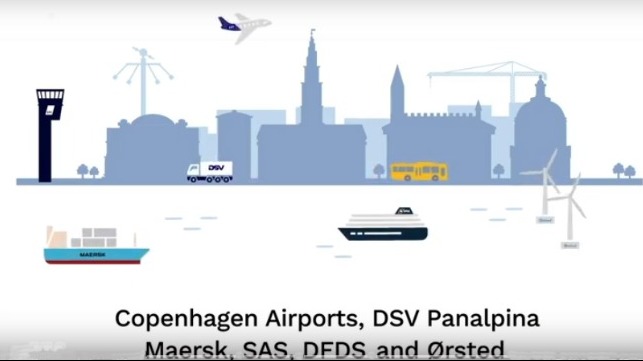Danish Companies Form Partnership to Develop Sustainable Fuel Project

Six Danish companies representing different segments of the transportation and power industries are coming together to form a partnership to produce sustainable fuels for road, maritime, and air transport in the Copenhagen area. The partnership brings together companies involved in the demand and supply side of sustainable fuels to develop an industrial-scale hydrogen and e-fuel production facility, which they hope will become a model for industry.
In announcing the new project, the six partners – which includes Copenhagen Airports, A.P. Moller - Maersk, DSV Panalpina, DFDS, SAS and Ørsted – said they hoped to be able to deliver more than 250,000 tonnes of sustainable fuel for busses, trucks, maritime vessels, and airplanes when production is fully scaled-up by 2030.Production potentially would be based on a total electrolyzer capacity of 1.3 gigawatts, which the partners said would likely make it one of the world’s largest facilities of its kind.
They believe that the fully scaled facility will contribute to an annual reduction in carbon emissions by 850,000 tonnes, which would contribute to Copenhagen’s ambitious policies for decarbonization. The electrolyzer facility they believe will not only be a potential cornerstone in decarbonizing the partners’ businesses but will also deliver a critical contribution to reaching Denmark’s ambitious goal of reducing carbon emissions by 70 percent by 2030.
In announcing the initiative, the partnership also called on governments and industry to come together to create a framework that encourages private investments in large-scale sustainable fuel projects. The partnership hopes that over time, this project will also act as a catalyst for similar projects in other parts of Denmark and internationally.
They acknowledged that the production of sustainable fuels needs to be developed on a larger scale to mature the process and drive down costs to make it competitive with traditional fossil fuels. They pointed to the success in the past decade in the development and commercialization of other renewable energy technologies, such as offshore wind, onshore wind and solar PV, highlighting the nearly 70 percent decline in the cost of offshore wind in Northern Europe since 2012.
Outlining how the development of sustainable fuels could reach into many sectors of industry, they highlight the projected role in their individual operations. The supply of renewable hydrogen would power zero-emission busses operated by Movia and heavy-duty trucks managed by DSV Panalpina, while renewable methanol would be used on A.P. Moller - Maersk vessels and renewable jet fuel (e-kerosene) for SAS airplanes and air transport out of Copenhagen Airports. The offshore wind power produced at Rønne Banke off the island of Bornholm would supply renewable electricity for the new production facility that will be located in the greater Copenhagen area.
The first stage of the project, which could be operational by 2023, will comprise a 10MW electrolyzer, which can produce renewable hydrogen used directly to fuel busses and trucks. Stage two, which could be operational by 2027, when the first offshore wind power from Bornholm could be delivered, comprises a 250MW electrolyzer facility that would combine the production of renewable hydrogen to produce renewable methanol for maritime transport and renewable jet-fuel (e-kerosene) for the aviation sector. Stage three would upgrade the project’s electrolyzer capacity to 1.3GW and capture more sustainable CO2, enough to supply more than 250,000 tonnes of sustainable fuels to be used in busses, trucks, maritime vessels, and airplanes.
The partnership plans to begin discussions with the regulatory authorities on the framework and policies needed to support the development of using sustainable fuels at scale in the transport sector in Denmark. They will also seek public co-funding to conduct a full feasibility study of the project and then by as early as 2021 make an investment decision for the first stage of the project.
